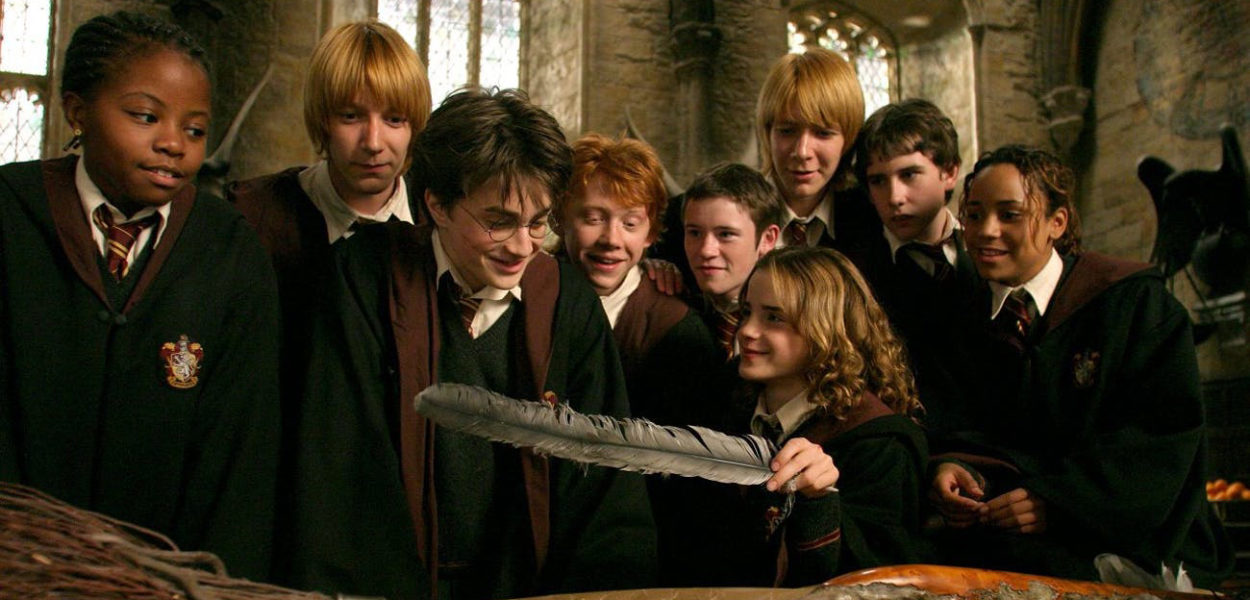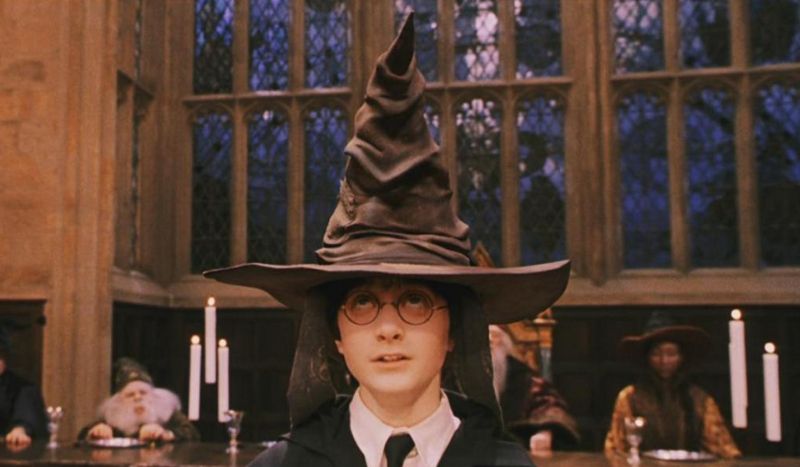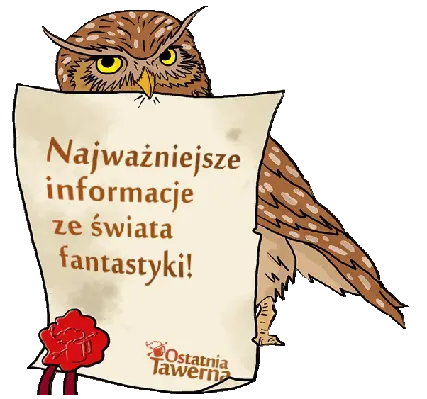
Michał: Speaking of universality, it is impossible not to mention the deeper motives and content that appear somewhere between the lines. Do you think the author placed them there on purpose and the plot is only an excuse to share them, or are they just an addition, enriching only the whole? Or is it just an over-interpretation of the fans? In Harry Potter , in my opiniondeeper content actually occurs and has been included in books on purpose, in order to evoke in every recipient, regardless of age, some reflections on life and man. We are talking about such motives as death, love, friendship, sacrifice or facing fears – phenomena that are not alien to any of us and which each of us has to deal with at some stage in our lives. By the way, I refer here to my Harry Motif series in which I analyze each of these themes in detail. Overall, Harry Potter changed my thinking on most of these issues, and I consider that to be another of his strengths.
Eliza: This is what I wrote about in the context of our first topic: the events in the book make such a strong impression on the reader that the emotions of the characters become his emotions and – especially with certain psychological similarities – it is easy to identify with them. I think then we are talking about this deep content. I am convinced that it was a deliberate, indeed sensational, procedure by Rowling. I believe that she invented a different world in which she could present her own.
I also consider it innovative to show races among the magical community and their hierarchy. Growing up in a very socially homogeneous country, I had little to do with being different. We meet this one in Harry at every step: there are wizards (for many, “the race of masters”), goblins, elves, tritons, etc. It was for me “as a kid” the first picture of the importance of coexistence and respect for people who are different from us beings and what the discrimination entails.
Mateusz: I cannot understand the controversy towards Harry Potter . The book, as Michał and Eliza mentioned, is loaded with positive models and deep content. Critics of Rowling accuse her of the lack of LGBT characters in books, references to black magic, etc., but they forget that the author tried to teach children to be tolerant, stigmatized discrimination against others on the basis of origin, and above all drew attention to the enormous power of friendship and love.
Krzysztof: As I mentioned during the conversation about the timelessness of Potter, I clearly see the deliberate promotion of certain attitudes and values and the condemnation of others. This is probably partly due to the youthful nature of the books, and partly to the fairy-tale roots of fantasy. And rather, I have nothing to complain about these presented values - I am also of the opinion that it was primarily about tolerance and understanding towards others, as well as faithfulness and loyalty, both towards people close to us, as well as ourselves and our beliefs. Consequently, like Mateusz, I do not understand the accusations that are being raised here and there against the series – in my opinion, it has no obligation to focus on absolutely every social problem. It is enough if the general message points us in the right direction.
So I think the series has a positive impact on the worldview of young people. For example, the topic of houses and the Allocation Tiara is great for kids on the verge of more serious life choices – on the one hand, we get information that it is worth paying attention to your strengths and predispositions and guided by them (Tiara’s verdicts), on the other hand, we can, yes like Harry, choose their own way in spite of these expectations and ultimately be fine.

Michał: While we’re at it – the so-called Hogwarts Houses where future students go to the school after the Assignment Ceremony. Each of them – Gryffindor, Hufflepuff, Ravenclaw and Slytherin favor certain traits and values. Which of them appeal to you and why?
Eliza: I probably won’t be original, but I would feel best in Gryffindor. I have always identified one hundred percent with their values, and true friendship has been worth every effort for me as far as I can remember. By the way, I’ve always wanted to live in the tower.
Mateusz: I have always dreamed of Slytherin, which – as Tiara mentioned – gives me greater opportunities for development (although Malfoy’s colleagues somewhat contradict it). Rowling idealizes Gryffindor a bit too much, putting only positive characters there. I get the impression that she has become a slave to the first books in this, more one-dimensional because of the kids. I missed interesting, positive and important characters from other homes. In addition, even if you try all year round and score the most points, Dumbledore awards the Gryffindors victory in the end.
Krzysztof: When I started my adventure with Potter , my closest thing was Gryffindor – after all, it’s the home of our brave, heroic protagonists! However, in the vicinity of the fifth volume, when I had already grown a bit, and the other houses also received a little more attention from the author and a handful of supporting characters representing them, the scales of my sympathy tipped in favor of Ravenclaw. There, moreover, he finally assigned me the “only true and official” Tiara test from Pottermore.com . And I’m fine with it – praise for intelligence, individualism and creativity is something that appeals to me! After all, I think I am something between a bookworm and Pomyluną Lovegood …
Michał: I will tell you honestly that when I collect all the attributes that individual houses prefer, I have the impression that I would find myself in everyone, because everyone requires at least one quality that I have myself – Gryffindor values courage and nobility, Hufflepuff honesty and determination, Ravenclaw intelligence and wisdom (yes, I know, my modesty beats the eyes), and Slytherin ambition. It seems to me, however, that I would actually like Gryffindor best, not only because of the fact that the main characters belonged to him and the general sentiment, but because of the fact that I identify with him the most as a whole, especially because of the glorification of loyalty and readiness. to sacrifice – qualities that I value in people above all else and that each of us should follow.
Eliza: I have to deny Matthew’s statement that Gryffindor has only positive characters, and there aren’t any other people. For example: Cormac McLaggen, the self-righteous Gryffindor that nobody likes. Maybe it is a drop in the ocean and most Gryffindors are the epitome of good, but nevertheless it destroys the image of the always noble members of this house. Moving on: Luna Lovegood, mentioned earlier by Krzysiek (a very interesting, complex and positive character), Cho Chang, Cedric Diggory, Hanna Abbott, Ernie Macmillan. And these are just a few examples … But the fact that Rowling closed the field a bit to show off the first volumes, where the differences were clearly outlined.
Krzysztof: As I have already mentioned, somewhere in the middle of the series, Rowling found out that at first she had a poor portrayal of houses, at least in terms of their representatives, and began to fix mistakes. In the first three parts, the Gryffindors are the good ones, the Slytherins are the bad ones, and Ravenclaw and Hufflepuff are just an irrelevant background. Only volumes four and five introduce more characters from these neglected houses, and in volume six there are attempts to humanize Slytherin students and to show that Gryffindor also has a few sluts. Hence the McLaggen and a scene from the Pensieve showing the Marauders in a bad light.
As for the values close to individual houses – I think you hit the nail on the head, Michał! Rowling thought about them so that none of them would be clearly worse and no one could feel disadvantaged by being placed in it. It works great both inside the story and from the fans’ point of view – no matter what’s most important to us, we’ll find a place in one of them.
More discussion to come soon!

